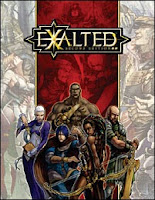Using a current RPG system -- one that you can get ahold of and are comfortable with -- and building everything Star Trek-related with it!
There are two general approaches for this:
- find a generic RPG system, get all the native source material for a Science Fiction game, and get started converting to Star Trek;
- find a specific Science Fiction system, and tweak it into a Star Trek setting.
Let's tackle Generic RPG system solutions first!
Generic RPG Systems
 Two of the go-to generic systems for traditional RPGs are the Hero System and GURPS. Each of them have a wealth of source material appropriate for a Science Fiction campaign and for a Star Trek campaign in particular.
Two of the go-to generic systems for traditional RPGs are the Hero System and GURPS. Each of them have a wealth of source material appropriate for a Science Fiction campaign and for a Star Trek campaign in particular.Hero has a reputation for being a little more supporting of -- well -- heroic gaming, while GURPS has a reputation for being slightly more gritty and less forgiving with regard to superhuman abilities and recovering from damage.
The Hero System has a genre book titled Star Hero. It discusses the various Science Fiction genres, dissects how these genres and subgenres are applicable to games (as opposed to fiction), and lays out how to put together a Science Fiction campaign. It gives guidelines on solar system and planet creation, as well as rules for weapons, armor, technology, and starships.
Hero also has two other supplements available that are of special interest to Star Trek fans. These are the Terran Empire sourcebook (the primary Hero System Science Fiction setting) and the Star Trek sourcebooks (an unofficial sourcebook put together by fans). The former is available for purchase, while the latter must be found by searching online.
GURPS 4th Edition has a sourcebook titled GURPS Space, is a revised version of the 3rd Edition book, and is also chock full of source material on creating your own Science Fiction setting, the benefits and pitfalls of certain setting decisions regarding political structures, technology levels, etc. There are character professions appropriate for the various aspects of interplanetary and intergalactic empires (complete with recommended skillsets), and sections on weapons and spaceships.
Of course, GURPS has several other sourcebooks that may be of use to someone looking to build their own Star Trek-ish universe: GURPS Ultra-Tech and GURPS Spaceships come to mind.
By the way, both these systems use normal six-sided dice as opposed to the polyhedral dice collections favored by D20 systems, so this shouldn't be a hinderance to getting your game on.
Other generic systems you may wish to consider, with slightly different RPG philosophies are the D6 system and FATE -- and each have their own respective books that include both the ruleset and genre source material in a single tome.
D6 Space is the latest (free) incarnation of the D6 ruleset which is probably best known for the original Star Wars RPG ruleset. It also uses only 6-sided dice, and favors cinematic styles of role-play for all types of conflict. Space combat in particular is interesting due to options that allow a non-map based style of play that is fast and furious -- though this may be at odds with the traditional capital ship combat that is emblematic of the Star Trek series.
Another thing that is of note: D6 is known for really fast character creation. With pre-prepared profession / archetype templates, you can have your players finished with mechanical character creation within minutes.
Starblazer Adventures may not seem like a very generic name for a generic RPG, but it can be considered the Science Fiction sourcebook for the current FATE ruleset. Its name is drawn from a series of British pulp SF comic books, but due to the breadth of SF settings that these comic books tackled in their lifetime, the RPG talks at length about creating your own campaign setting.
FATE itself has a reputation for being more narrative in its approach to RPGs, and unless you've been playing a variety of RPGs for a while, that may not make a lot of sense. Suffice it to say that the mechanics focus less on attempting to model an internally consistent and plausible reality, and more on telling an internally consistent and satisfying story using game mechanics.
Interestingly, there's another FATE entry in the Science Fiction RPG arena -- one that attempts to describe a more Hard Science Fiction feel to a campaign. You may wish to pick this RPG (known as Diaspora) as well, and mine it for rules, guidelines, and source material that is also appropriate for the Star Trek settings.
continued in Part III
continued in Part III









